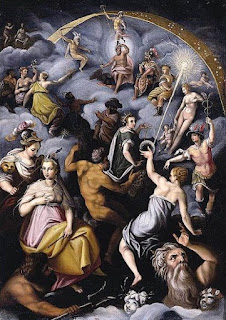Wrong Ideas on the Origin of Polytheism
Those of us who have been raised believing that there is only one God may find it difficult to comprehend that there are cultures that worship many. Animism has multiple spirits that people pray to, which is seldom known in the Western world. Polytheism is the belief in many gods.
Some folks claim that the global flood story in the Gilgamesh epic poem was copied by the Hebrews. It is to laugh. Those gods were like children who gained power, squabbling with each other, messing with humans, and so on. Looking at mythologies, we see that many groups were polytheistic.
 |
| The Assembly of the Gods, Jacopo Zucchi 1576, WikiComm |
In reality, the opposite is true. People believed in one God, and eventually suppressed the truth and went all in for polytheism. This is not difficult to believe, because Israel swung like a pendulum between serving the Lord, then false gods, the Lord, false gods — take a look at 2 Kings 21. Polytheistic behavior around the world was most likely a result of the dispersion at Babel. Also, archaeological findings also support how people were originally monotheistic.
It is generally believed by secular cultural anthropologists, as well as many modern philosophy of religion experts, that monotheism arose out of polytheism. This is generally attributed to one of two methods.
. . .
But starting in the early twentieth century, archaeologists began to uncover clues in written records found during excavations and archaeological digs that the exact opposite was true. The earliest pictographs, hieroglyphics, cuneiform, or runic writings of discovered or excavated cultures pointed to an original monotheism which became more and more corrupted into animism or polytheism:
To read the entire article, click on "Does Monotheism Predate Polytheism?"